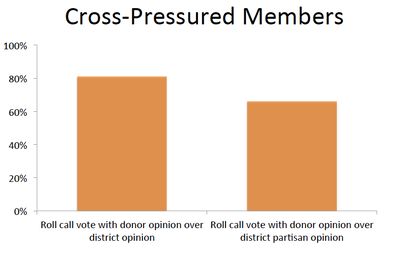Kenneth M. Miller
Individual Donors and Legislative Voting in the U.S. House
(with Brandice Canes-Wrone)

Research shows that members of the U.S. House are increasingly reliant on donors from outside of their districts, yet little is known of how a reliance on a national donor class affects members' legislative positions. Drawing together data on House member characteristics, campaign contribution data, and district-level opinion data on specific roll call votes by U.S. House members from 2006 to 2016, we show that members of the U.S. House of Representatives are responsive in their roll call voting to the policy preferences of their party’s national donor class, even after accounting for other well-established influences. In addition, we find that this responsiveness increases with the member’s electoral security in their district, and that greater out-of-district contributions are associated with members’ increased responsiveness to their party’s national donor pool. Our findings suggest that as redistricting and partisan sorting decrease electoral vulnerability for members, representation increasingly skews towards the donor class at the expense of district preferences.